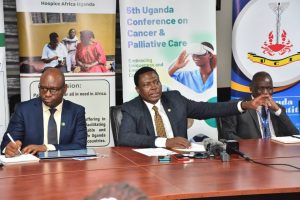
Uganda is set to host the 5th Uganda Conference on Cancer and Palliative Care bringing together health experts, policymakers, researchers, and community advocates to address gaps in treatment and support for patients facing life-threatening illnesses.
Organized by the Ministry of Health in partnership with the Uganda Cancer Institute (UCI) and the Palliative Care Association of Uganda (PCAU), this year’s conference will run under the theme “Embracing Uniqueness and Empowering Communities.” The organizers say the theme reflects the urgent need for inclusive, patient-centered approaches that consider Uganda’s diverse socio-economic, cultural, and geographical realities.
The event will focus on strengthening community-driven solutions to improve access, equity, and holistic care for patients. Participants will share research findings, exchange best practices, and explore innovative strategies including technology and artificial intelligence to expand cancer and palliative care services.
The conference will showcase cancer and palliative care research from East Africa and beyond, share strategies to standardise care across sub-Saharan Africa, document available resources for training and service delivery, and promote collaboration among institutions at national, regional, and international levels.
Key discussion areas will include: personalized and culturally inclusive care; community-driven care models; the role of innovation, technology, and AI; empowerment of healthcare professionals and caregivers; advocacy and sustainable financing; and care for special and underserved populations.
Dr. Olaro Charles, Director General of Health Services at the Ministry of Health, said the theme captures the dual priorities of tailoring care to each patient’s circumstances and strengthening community participation.
“The theme of this conference ‘Embracing Uniqueness’ means tailoring care to the patient’s culture, age, condition, and needs,” he explained.
‘Empowering Communities’ means giving people the knowledge, resources, and voice to take part in their own care. Strong community involvement improves early detection, adherence to treatment, and holistic support.”
Dr. Jackson Orem, Executive Director of the Uganda Cancer Institute, noted that while progress has been made in prevention, diagnosis, and treatment, many patients still present late and face challenges in accessing essential services.
“This conference is a vital platform to exchange knowledge, share research, and collaborate to close gaps in patient care,” he said.
Mark-Donald Mwesiga, Executive Director of PCAU, emphasized the importance of palliative care in improving quality of life.
“Palliative care is not a luxury it is a right. As we embrace the uniqueness of our patients and communities, we must ensure care is holistic, compassionate, and accessible to all. This conference gives a voice to those often unheard and celebrates the inspiring work happening in communities,” he said.
The three-day program will include plenary sessions, interactive workshops, and science presentations designed for both professionals and the general public.
Featured activities will include: A high-level side event on health financing, leadership, and governance for CEOs and board members of cancer and palliative care institutions.
A survivorship symposium for patients and families. Workshops on access to medicines, humanitarian approaches, and emergency preparedness. Poster presentations and networking opportunities for participants from across the region.
Uganda records an estimated 34,000–36,000 new cancer cases annually, with over 24,000 deaths. Only about 20% of patients reach UCI for treatment, and survival rates remain low. The government is responding by expanding treatment capacity, introducing advanced radiotherapy equipment, and improving diagnostics.
Palliative care which focuses on improving the quality of life for people with serious illnesses is available in 230 accredited facilities across 107 districts, but reaches only about 10–11% of those in need.
Uganda is recognized as a leader in Africa for integrating palliative care into its national health system, supported by free oral morphine provision and a dedicated Division of Palliative Care within the Ministry of Health.
Since 2017, UCI and PCAU have co-hosted four successful biennial conferences, drawing participants from around the world and helping to advance the availability, accessibility, quality, and equity of cancer and palliative care services.
Organizers say the 2025 edition will build on this track record to set new commitments and collaborations for the next decade.